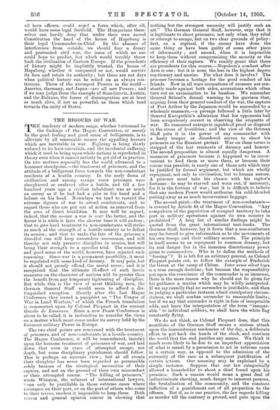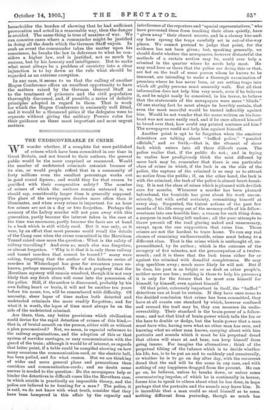T HE tendency of modern usage, whether buttressed by the findings
of the Hague Convention, or merely by the good feeling and good sense of belligerents, is to alleviate by all reasonable means the appalling horrors which are inevitable in war. Fighting is being slowly reduced to its bare essentials, and the incidental suffering which it used to bring upon whole nations is reprobated in theory even when it cannot entirely be got rid of in practice. On two matters especially has the world advanced to a humaner standpoint,—the treatment of prisoners, and the attitude of a belligerent force towards the non-combatant residents of a hostile country. In the early dawn of civilisation and among savage races prisoners were slaughtered or enslave after a battle, and till a few hundred years ago a civilian inhabitant was as much an enemy as if he had had a pike in his band and a helmet on his head. Nowadays we tend to restrict the extreme rigours of war to actual combatants, and to regard those who are put out of action as removed from the area of direct hostilities. It may well be argued, indeed, that the sooner a war is over the better, and the fiercer it is while it lasts the shorter time it will endure ; that to give hard treatment to non-combatants will strike as much at the strength of a hostile country as to defeat its armies ; and that to make the fate of the prisoner a dreadful one will keep surrenders uncommon, and will thereby not only preserve discipline in armies, but will bring their strength to a speedier trial. The conscience and good sense of the world, however, have rejected such reasoning. Since war is a permanent possibility, it must be regulated with some kind of decency. It may pain, but it should not grossly offend, the moral sense ; and it is recognised that the ultimate ill-effect of such heroic measures on the character of nations will be greater than the benefit from any temporary tightening of discipline. But while this is the view of most thinking men, the German General Staff would seem to afford a dis- tinguished exception. Shortly after the last Hague Conference they issued a pamphlet on "The -Usages of War in Land. Warfare," of which the French translation is commented upon by Colonel Picquart in the current Gazette de Lausanne. Since a new Peace Conference is about to be called, it is instructive to consider the views on a matter which must come under its survey held by the foremost military Power in Europe.
The two chief points are concerned with the treatment of prisoners, and of non-combatants in a hostile country. The Hague Conference, it will be remembered, insisted upon the humane treatment of prisoners of war, and laid down that even in cases of attempted escape, not death, but some disciplinary punishment should follow. This is perhaps an extreme view ; but at all events their slaughter has never been regarded as permissible solely because of the strategical necessities of their captors, and not on the ground of their own misconduct or their attempted rescue. "The killing of prisoners," wrote Wheaton, the soberest of international lawyers, "can only be justifiable in those extreme cases where resistance on their part, or on the part of others who come to their rescue, renders it impossible to keep them. Both reason and general opinion concur in showing that nothing but the strongest necessity will justify such an act." The German General Staff, however, urge that it is legitimate to shoot prisoners, not only when they rebel or attempt to escape, but on two clear grounds of policy : first, as a reprisal, if the enemy have done the same thing or have been guilty of some other piece of inhumanity ; and second, when it is 'impossible to keep them without compromising the security or the efficiency of their captors. We readily grant that there are precedents for this course,—Napoleon's conduct after Acre is one ; but it is none the less in the highest degree reactionary and unwise. For what does it involve ? The prisoner becomes a, hostage for the good conduct of his friends. Now in all wars accusations of excesses are con- stantly made against both sides, accusations which often turn out on examination to be baseless. We remember General StOssel's dismal warning to his garrison that, arguing from their general conduct of the war, the capture of Port Arthur by the Japanese would be succeeded. by a wholesale massacre,—a presage followed a little later by General Kuropatkin's admission that his opponents had been scrupulously correct in observing the etiquette of war. No rumoured outrage is capable of proof or disproof in the stress of hostilities ; and the view of the German Staff puts it in the power of any commander with a hasty temper or disordered. nerves to shoot his prisoners on the flimsiest pretext. War on these terms is stripped of the last remnants of decency and honour. The second proposition is almost equally dangerous. A massacre of prisoners because it happened to be incon- venient to feed them or move them, or because their rescue was possible, is surely one of those acts which may be justified by formal argument, but which are wholly repugnant, not only to civilisation, but to human nature. A prisoner must take his chance with his captor's fortunes : he may be starved and worn out, if necessary, for it is the fortune of war ; but it is difficult to believe that any modern Power would authorise his cold-blooded putting-away as so much inconvenient baggage.
The second point—the treatment of non-combatants— is covered by Article 44 of the Hague Convention. "Any compulsion of the population of occupied. territory to take part in military operations against its own country is prohibited." A long list of similar findings might be quoted from the great international text-books. The German Staff, however, lay it down that a non-combatant may be forced to give information as to the movements of his own troops and their military secrets. The principle in itself seems to us repugnant to common decency, but its real danger lies in the immense discretionary power given to commanders. Who is to define the methods of " forcing " ? It is left for an arbitrary general, as Colonel Picquart points out, to follow the example of Frederick the Great at the camp of Chlum. Inter arnui silent leges is a true enough doctrine ; but because the responsibility put upon the conscience of the commander is so immense, there is the more reason why he should not be given for his guidance a maxim which may be wildly interpreted. If we say roundly that no surrender is justifiable, and then in judging a, particular instance admit exculpatory circum- stances, we shall confine surrender to reasonable limits ; but if we say that surrender is right in face of insuperable odds, and leave the interpretation of the term " insuper- able " to individual soldiers, we shall have the white flag constantly flying.
We do not think, as Colonel Picquart does, that this manifesto of the German Staff means a serious attack upon the humanitarian tendencies of the day, a deliberate effort to put back the hands of the clock, and convince the world. that the end justifies any means. We think it much more likely to be due to an imperfect appreciation of what is meant by a permission to act in extreme cases in a certain way, as opposed to the admission of the extremity of the case as a subsequent justification of certain actions. Our meaning may be explained by a simple instance. Suppose that our law categorically allowed a householder to shoot a thief found upon his premises. Such a maxim would mean a great deal of indiscriminate shooting, much danger to innocent persons, the brutalisation of the community, and the constant infliction of a punishment out of all proportion to the offence. But if, as is our practice, the law regards killing as murder till the contrary is proved, and puts upon the householder the burden of showing that he had sufficient provocation and acted in a reasonable way, then the danger is avoided. The same thing is true of maxims of war. We can conceive cases where a commander might be justified in doing all the deeds which the German Staff enjoin. In such an event the commander takes the matter upon his conscience, he breaks the law in deference to what he con- siders a higher, law, and is justified, not so much by success, but by his honesty and intelligence. But to make what must always be a problem of casuistry into a clear injunction is to lay down as the rule what should be regarded as an extreme exception.
In any case, it seems to us that the calling of another Hague Conference offers an excellent opportunity to have the matters raised by the German General Staff as to the treatment of prisoners and the civil population thoroughly discussed, and, if possible, a series of definite principles adopted in regard to them. That is work for which the Hague Conference is eminently well fitted, and it would be a thousand pities if the delegates were to separate without giving the military Powers rules for their guidance on these most important and most urgent matters.















































 Previous page
Previous page